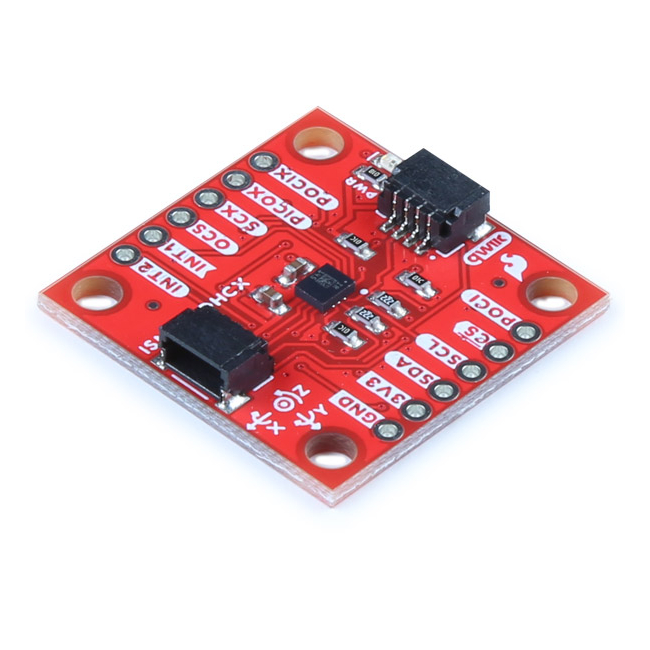SparkFun 6DoF IMU Breakout - ISM330DHCX (Qwiic)
The SparkFun Qwiic ISM330DHCX Six Degrees of Freedom IMU is a standard-sized, 1in. by 1in. breakout featuring STMicroelectronics' ISM330DHCX; a high-performance 3D digital accelerometer and 3D digital gyroscope tailored for Industry 4.0. Applications such as platform, optical image, lens stabilization, robotics and industrial automation, navigations systems, and vibration monitoring and compensation are made easy with this small board. The Qwiic 6DoF IMU communicates over I2C by default utilizing our handy Qwiic Connect System so no soldering is required to connect it to the rest of your boards. However, we still routed the I2C signals out to a set of 0.1”-spaced pins for users who prefer a soldered connection.
This 6DoF IMU Breakout has a full-scale acceleration range of ±2/±4/±8/±16g and a wide angular rate range of ±125/±250/±500/±1000/±2000/±4000 dps that enable its usage in a broad range of applications. An unmatched set of embedded features (Machine Learning Core, programmable FSM, FIFO, sensor hub, event decoding and interrupts) are enablers for implementing smart and complex sensor nodes which deliver high performance at very low power.
The SparkFun Qwiic connect system is an ecosystem of I2C sensors, actuators, shields and cables that make prototyping faster and less prone to error. All Qwiic-enabled boards use a common 1mm pitch, 4-pin JST connector. This reduces the amount of required PCB space, and polarized connections mean you can’t hook it up wrong.
Features:
- 1.71V to 3.6V supply voltage
- ±2/±4/±8/±16g 3D accelerometer with selectable full scale
- ±125/±250/±500/±1000/±2000/±4000dps 3D gyroscope with extended selectable full scale
- Temperature range: -40 to +105°C
- Embedded compensation for high stability over temperature
- Auxiliary SPI serial interface for data output of gyroscope and accelerometer (OIS and other stabilization applications)
- Six-channel synchronized output
- Sensor hub feature to collect data from additional external sensors
- Embedded smart FIFO up to 9kB
- Programmable Finite State Machine to process data from accelerometer, gyroscope, and external sensors
- Machine Learning Core
- Smart embedded functions and interrupts: tilt detection, free-fall, wakeup, 6D/4D orientation, click and double-click
- Embedded pedometer, step detector and counter
- Embedded temperature sensor
- I2C Address: 0x6B (Default), 0x6A (Alternate)
- 2x Qwiic Connection Ports
Documents:
- Schematic
- Eagle Files
- Board Dimensions
- Hookup Guide
- Datasheet (ISM330DHCX)
- Qwiic Information Page
- Arduino Library
- GitHub Hardware Repo
Videos
| Manufacturer | SparkFun |
|---|




